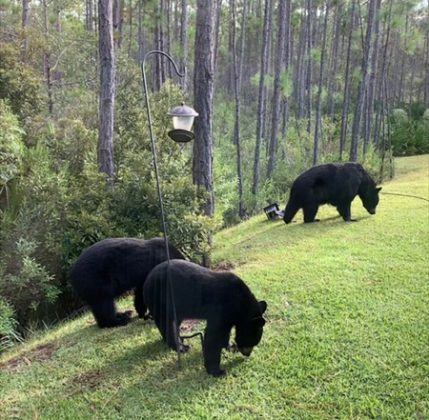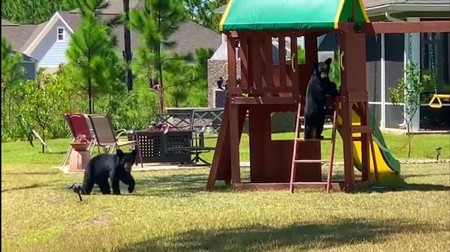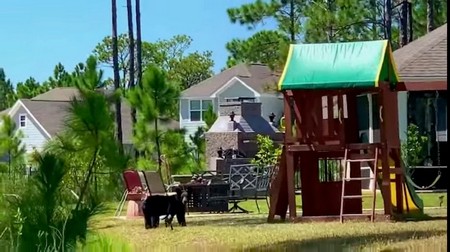J.S. Green
Imagine seeing a large male bear hanging out by your backyard firepit as if he were ready to watch the sunset while waiting on an evening cocktail of honey in a highball glass. What about a bear cub climbing the ladder of your child’s playhouse in your backyard, fortunately while your child was not around? Welcome to my life and my neighborhood. I’ve seen night cam footage of a mama bear and her two cubs walking down the sidewalk, looking for a full trash can. Then there was the other time a cute bear cub entertained itself by spinning a garden windmill decoration, again caught on a night cam, in our neighbor’s backyard. Cute? Fascinating? Maybe. If it’s not in your backyard.
Living in the thickly wooded Santa Rosa Beach area, I feel as if I’ve been transported back in time to the wilds of 19th century Florida. As a newly developed, we love our community and its surroundings. But, wild animals in our backyards is dangerous. What measures can a community take to keep bears from getting too comfortable? Too close?
“Removing attractants is important to prevent human and bear interactions,” says Florida Fish and Wildlife Conservation Commission (FWC) spokesperson, Bekah Nelson. Attractants are trash cans, bird feeders, pet food bowls, and uncleaned grills and smokers, etc. When a bear sees a neighborhood as a food source, they become reliant on that food source, and they don’t hunt as much. The likelihood of a bear being hit by an automobile, killed by illegal shooting, or trapped by FWC and killed because it’s become a hazard, is higher. So, “a fed bear is a dead bear.” After preventative measures have been consistently made in a neighborhood, it can take several weeks for a bear to learn that the community is no longer a place to find food.
Relocation isn’t a likely option as the bear will come back, often crossing highways, potentially causing danger for motorists. However, the FWC considers trapping on a case-by-case basis. Also, it is against the law in Florida to shoot a black bear. If you see a bear, the first action should be to give the bear space and walk away. Learn how to “Scare that Bear,” or deter a bear by using bear spray; view this one-minute video by hunting journalist, Craig Boddington, to learn how.
“We’re impeding on their home. From a law enforcement perspective: do your due diligence and don’t give them a reason to come to your neighborhood. Don’t put garbage cans out until morning of trash pick-up.” Public Information Officer, Corey Dobridnia, Walton County Sherriff’s Department.
Six “at-home” practices to exercise bear safety, according to the BearWise website:
- Do not feed or approach a bear – Feeding a bear teaches it to approach humans as a pet would its owner for a “treat.” A bear may feel threatened and “bluff charge” or stomp and make noise; it’s not preparing to attack. It wants you to go away.
- Secure food, garbage, and recycling. Set garbage out on the day of your trash pick-up, not the night before.
- Remove bird feeders when bears are active. It’s a treat to them. Learn of other ways to feed birds.
- Do not leave pet food outdoors. Pet food is high in protein and fat, which bears love.
- Clean and store grills. Thoroughly clean and cover your grill or smoker.
- Make neighbors aware of bear activity. Whether you’re intentionally or unintentionally attracting bears, their presence is a safety issue. Alert neighbors and your local fish and wildlife agents of bear activity.
Protect your family as well as bears by educating yourself and others. You may contact your local fish and wildlife commission and invite a bear biologist or wildlife assistance biologist to a meeting in your community. Visit myfwc.com/wildlifehabitats/wildlife/bear/wise/ or www.bearwise.org/ for further information on how to live with bears in your area.
The post Bears in the ‘Hood: How to Live Safely with the Florida Black Bear appeared first on South Walton Life | 30A News, Events and Community Information.




Be the first to comment on "Bears in the ‘Hood: How to Live Safely with the Florida Black Bear"